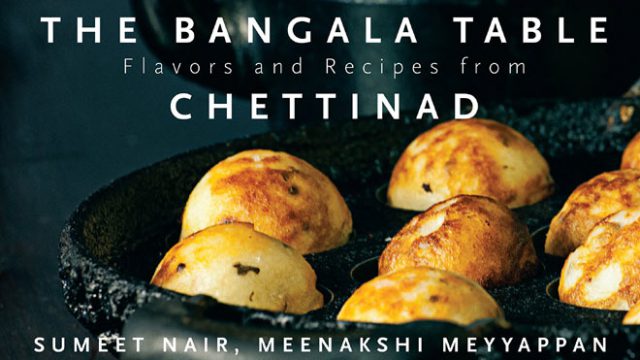Traditional Chettiar cooking is the original glocal cuisine.The successful merchant’s table was perforce spiced by his wares from foreign ports. It was flavoured with the spices and herbs of Indochine, perfumed by the fruits of Arabia and Africa, dressed up in Continental courses, all massaged on to the Southern Indian staples of rice and lentils and into the flesh of local fish and fowl. So while the Bangala House’s rendition of ‘Flavors and Recipes from Chettinad’ might make the purist sniffy, we won’t turn up our noses at Brussels sprouts masala poriyal here at OT. We like our food to be well-travelled, and even the window dressing of celebrity photographer and foreigner’s foreword does not shadow our hopefulness when The Bangala Table falls into our hands.
Especially should there be a crab rasam, a quail 65, an Anglo-Indian mutton cutlet, some chow-chow kootu and a tender coconut mousse to accompany them all, besides curd rice and hot, tangy vatha kozhambu. And there is. As well as such stalwarts as ven pongal and pineapple curry, there are sweet surprises like kavanarisi (a glutinous black rice breakfast pudding that owes its key ingredient to Southeast Asian sojourns). But alas old-fashioned pigeon soup and brain ball curry tantalise only from old menus pictured. We will overlook such omissions because of the inclusion of that regional riddle of mandi, a tamarind-soured family of curries whose magic formula includes water from washing the day’s rice! And because of the complex vegetable sodhis from Sri Lanka, where Bangala hostess Meenakshi Meyyappan grew up.
The meat of this recipe book is surprisingly sinewy, with the secret of a good curd and podi, the technical tricks of dosa declensions (crisp murukai, soft izhan, ghee roast), and a modern emphasis on vegetables. Recipes may lack timing information and visuals may be a little pallid, with trite props — perhaps intended for sepia-tinted visual consumption; but the latter are at least chaste in terms of food styling and the former satisfyingly detailed.




